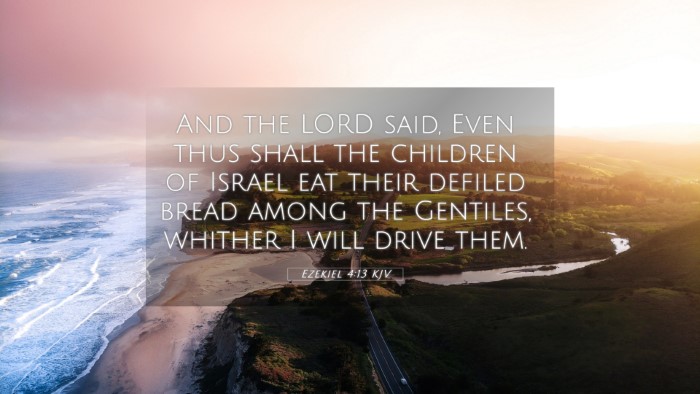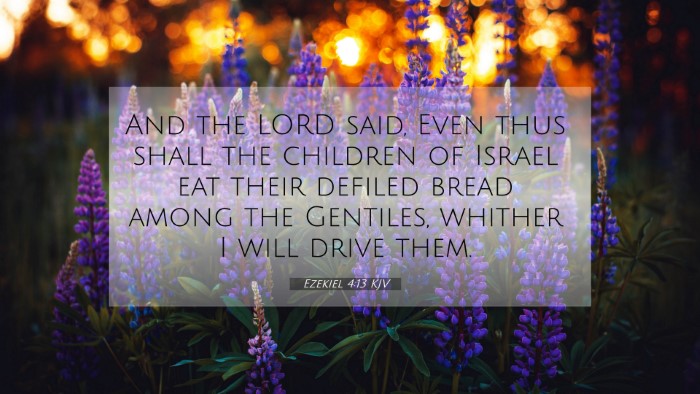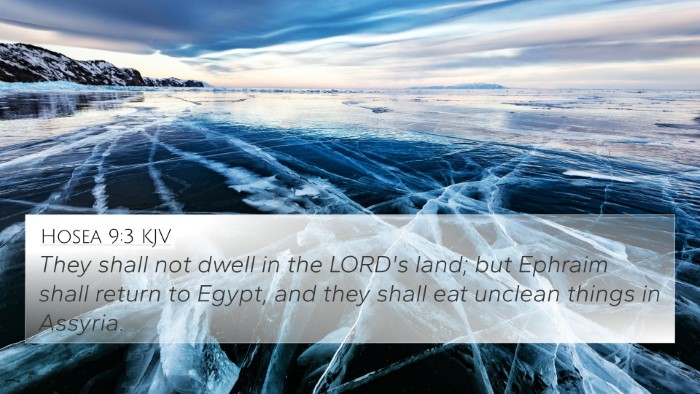Ezekiel 4:13 Meaning and Interpretation
Ezekiel 4:13 states, "And the LORD said, Even thus shall the children of Israel eat their defiled bread among the Gentiles, whither I will drive them." This verse conveys the Lord's message about the impending consequence of Israel’s sins, particularly referring to their impending exile and the spiritual and physical defilement they would experience.
Contextual Background
In the book of Ezekiel, the prophet receives various commands from God, many involving symbolic acts that demonstrate the spiritual state of Israel. This chapter emphasizes the themes of defilement and the judgment that results from Israel’s disobedience. Ezekiel's acts are often meant to serve as visual illustrations of the deeper spiritual truths affecting the nation.
Insights from Matthew Henry's Commentary
- Henry emphasizes the serious and alarming consequences of Israel's idolatry and unfaithfulness to God.
- He notes that eating defiled bread signifies the deprivation and degradation that Israel would suffer during their exile among the Gentiles.
- Henry explains that the bread here represents not only physical sustenance but also the spiritual nourishment that the Israelites would lack in their disobedience.
Insights from Albert Barnes' Commentary
- Barnes draws attention to the prophetic symbolism of the bread being 'defiled,' linking it to the loss of holiness that would characterize Israel's experience among other nations.
- He suggests that this defilement illustrates the complete reversal of Israel's covenant relationship with God, leading to their alienation from His blessings.
Insights from Adam Clarke's Commentary
- Clarke highlights the metaphor of eating defiled bread as a representation of the Israelites’ spiritual state during their exile.
- He also connects this verse to the broader theme of judgment as a significant consequence of their continued disobedience to divine commands.
Bible Cross-References
- Isaiah 65:4 - Addresses the idea of unclean food and practices that Israel would face.
- Jeremiah 24:5 - Relates to the judgment on Judah and their experience in exile.
- Daniel 1:8 - Example of defilement and the choice to uphold God’s laws in a foreign land.
- Leviticus 11:43 - Discusses the prohibition against eating unclean things, linking to the concept of defilement.
- Isaiah 1:19-20 - Addresses the choice between obedience leading to blessings and disobedience leading to judgment.
- Ezekiel 3:13 - Connects with Ezekiel’s responsibility to deliver God’s message, reflecting the theme of divine communication.
- Amos 8:11-12 - Talks about the famine of the word of the Lord, linking to Israel’s spiritual starvation in exile.
Conclusion
Ezekiel 4:13 serves as a profound reminder of the consequences that arise from disobedience and idolatry. Through careful examination of this text and its connections with others, one can appreciate the overarching narrative of Israel's relationship with God, the themes of judgment, and restoration.
This verse illustrates the importance of understanding Bible verse cross-references as it demonstrates the inter-Biblical dialogue that enriches the understanding of scripture. Utilizing tools for Bible cross-referencing can help uncover the layers of meaning and thematic connections present in the Scriptures.




